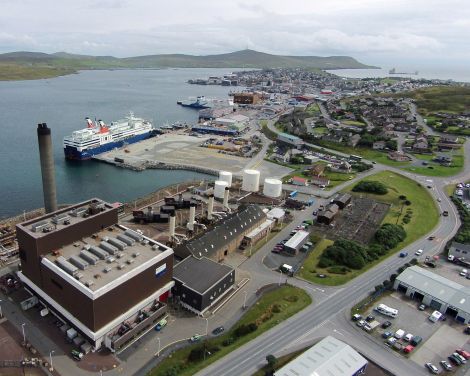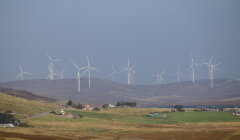Energy / Developers defend green credentials of gas power station idea amid concerns over emissions
THE TEAM behind proposals for a gas power station in Shetland have defended the idea’s green credentials by saying it would offer less carbon emissions than the current diesel-fired Lerwick station.
The recently mooted idea of a 50MW station which utilises LNG (liquified natural gas) as a way to power Shetland has drawn contrasting views on social media.
Some say a gas station is a better option for Shetland than large wind farms and a subsea transmission link, but others question why a fossil fuel is being pursued at a time when Scotland is looking to achieve net zero emissions of all greenhouse gases by 2045.
The oil and gas industry, for example, is focusing on going ‘greener’, with Shetland Gas Plant operator Total announcing this week that it will look to go net zero by 2050.
LNG is liquid formed when natural gas is cooled to minus 162 degrees Celsius, with the process shrinking the volume of gas enough to 1/600th – making it easier to store and transport.
It is said to be the “cleanest” fossil fuel and a possible bridge towards renewable energy.
When asked by Shetland News why gas should be an option when there is a drive to decarbonise, Poul Kragh-Hansen of Danish firm BWSC – one of two companies behind the plans alongside Shell-owned Gasnor – said there would be less emissions than the current fuel-powered Lerwick Power Station, which is due to close before 2026.
He also pointed to the team’s suggestion that the NorthLink ferries could convert in some way to LNG.
“Our submission deals with the CO2 emissions presently generated by the current regime where oil and oil products have a monopoly,” Kragh-Hansen said.
“Using gas instead of oil on the islands, including for ship bunkering, and especially for the Aberdeen ferries, brings large CO2 reductions and lower prices.”
Become a member of Shetland News
Kragh-Hansen confirmed that the “best practicable” available option was to import LNG, likely to be from Scandinavia or the Baltic Sea.
Some have questioned why gas could not be imported from the gas plant near Sullom Voe Terminal, but LNG is not produced there.
The current set-up at the Total-operated plant is for natural gas to be exported south to St Fergus in Aberdeenshire after it has been treated and compressed.
Kragh-Hansen said “it can never make sense” to invest in an LNG facility at Sullom Voe “with their relatively small quantities of gas and then convert it miles away in Lerwick.
“Our original idea in 2016 was to have compressed gas – much cheaper to produce than LNG, but also more bulky – from Total/Sullom Voe,” Kragh-Hansen said.
“We were unable to have guaranteed supplies for the duration of the power plant contract from that source. So the best, practical alternative was shown to be imported LNG.”
Under the proposals there would be an LNG storage facility and a so-called regassification station converting the LNG into natural gas which will be piped to the power station.
The idea is being raised in response to a consultation on energy regulator Ofgem’s minded-to approve position on a 600MW interconnector between Shetland and Caithness, which would pave the way for large wind farms to export energy.
When asked if the plans were being touted too late in the day, Kragh-Hansen said: “Ofgem’s primary duty is to ensure that Shetland’s electricity supply is secure, economic and that however it is delivered, the UK consumers who are paying for it all, get it at the ‘best value for money’.”
Last month Ofgem approved plans for a 600MW transmission link – which could bring power into Shetland as well as export – on the condition that there was sufficient evidence by the end of the year that the 103-turbine Viking Energy wind farm would be going ahead.
Become a member of Shetland News
Shetland News is asking its readers to consider paying for membership to get additional perks:
- Removal of third-party ads;
- Bookmark posts to read later;
- Exclusive curated weekly newsletter;
- Hide membership messages;
- Comments open for discussion.
If you appreciate what we do and feel strongly about impartial local journalism, then please become a member of Shetland News by either making a single payment, or setting up a monthly, quarterly or yearly subscription.














































































